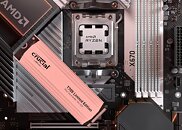- Joined
- Oct 9, 2007
- Messages
- 47,675 (7.43/day)
- Location
- Dublin, Ireland
| System Name | RBMK-1000 |
|---|---|
| Processor | AMD Ryzen 7 5700G |
| Motherboard | Gigabyte B550 AORUS Elite V2 |
| Cooling | DeepCool Gammax L240 V2 |
| Memory | 2x 16GB DDR4-3200 |
| Video Card(s) | Galax RTX 4070 Ti EX |
| Storage | Samsung 990 1TB |
| Display(s) | BenQ 1440p 60 Hz 27-inch |
| Case | Corsair Carbide 100R |
| Audio Device(s) | ASUS SupremeFX S1220A |
| Power Supply | Cooler Master MWE Gold 650W |
| Mouse | ASUS ROG Strix Impact |
| Keyboard | Gamdias Hermes E2 |
| Software | Windows 11 Pro |
Memory and SSD maker Crucial noticed an uptick in support requests by users claiming that their Gen 5 or Gen 4 NVMe SSDs would drop to PCIe Gen 1 speeds, besides being unable to boot into Windows after a restart. Crucial then did some digging, and localized the issue to users with motherboards based on the AMD X670E chipset, AMD's flagship Socket AM5 platform chipset. While not a function of the chipset itself, it turns out that there is a flaw in the way AMD designed the PCI-Express I/O of the X670E platform, specifically the PCIe Gen 5-capable M.2 NVMe interfaces that are attached to the CPU, causing them to drop in speeds to Gen 1. This problem isn't surfacing on the AMD B650 or the B650E, or even the X670—it is oddly specific to the X670E, despite the Gen 5 M.2 NVMe slots not being wired to the chipset.
While AMD made no public statement on the technical aspect of the flaw, if we were to guess, this could be a faulty implementation of PCIe ASPM (active state power management) at the firmware level, which reduces the speed of the PCIe link layer to reduce power. The default setting for PCIe ASPM in most motherboard UEFI setup programs tends to be "disabled," although there could be a bug in the firmware of X670E motherboards, causing it to engage, and in a buggy manner. Most UEFI BIOS setup programs tend to have two separate sets of PCIe ASPM settings—one for the CPU-attached PCIe root (which includes the x16 PEG and CPU-attached NVMe slots), and the other for downstream PCIe connectivity from the chipset.

Crucial suggested users to move their drives to the M.2 Gen 4 slots that are wired to the X670E chipset while they await UEFI firmware updates from their motherboard vendors. This works around the problem—at least you get Gen 4 x4 speeds if not Gen 1 x1. MSI is the first manufacturer to respond with UEFI firmware updates that correct the issue, letting users switch back to the faster CPU-attached Gen 5 NVMe slots. It remains to be seen if the issue affects the new AMD X870E, which launched earlier this week. The X870E is practically the same platform as the X670E.
View at TechPowerUp Main Site | Source
While AMD made no public statement on the technical aspect of the flaw, if we were to guess, this could be a faulty implementation of PCIe ASPM (active state power management) at the firmware level, which reduces the speed of the PCIe link layer to reduce power. The default setting for PCIe ASPM in most motherboard UEFI setup programs tends to be "disabled," although there could be a bug in the firmware of X670E motherboards, causing it to engage, and in a buggy manner. Most UEFI BIOS setup programs tend to have two separate sets of PCIe ASPM settings—one for the CPU-attached PCIe root (which includes the x16 PEG and CPU-attached NVMe slots), and the other for downstream PCIe connectivity from the chipset.

Crucial suggested users to move their drives to the M.2 Gen 4 slots that are wired to the X670E chipset while they await UEFI firmware updates from their motherboard vendors. This works around the problem—at least you get Gen 4 x4 speeds if not Gen 1 x1. MSI is the first manufacturer to respond with UEFI firmware updates that correct the issue, letting users switch back to the faster CPU-attached Gen 5 NVMe slots. It remains to be seen if the issue affects the new AMD X870E, which launched earlier this week. The X870E is practically the same platform as the X670E.
View at TechPowerUp Main Site | Source






